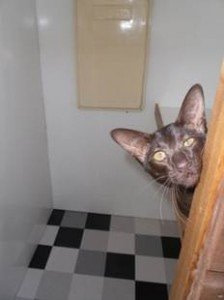 How can I find my cat is sadly a question I have been asked many times before. I decided I would add an article on covering this very subject in the hope that it may reduce the risks of lost cats and also in the event of your cat being lost to act as a guide to answering the question – How can I find my cat?
How can I find my cat is sadly a question I have been asked many times before. I decided I would add an article on covering this very subject in the hope that it may reduce the risks of lost cats and also in the event of your cat being lost to act as a guide to answering the question – How can I find my cat?
How to Find Your Lost Cat
We all love our cats and want to take the very best care of them, but what should you do if the unthinkable happens and your cat goes missing? This article offers suggestions to give you the best possible chance of being reunited with your cat.
Prevention is Better Than Cure!
As a cat owner, it is sensible to take precautions to prevent your cat from straying, if you do decide to let your cat out. There are several simple suggestions that can help keep your cat safe.
Indoor or Out?
 Everyone knows how much cats enjoy the outdoors, however cat owners are right to be cautious with the risks that cats face of straying, traffic and being stolen. The dilemma of indoor or outdoor cat is something that only you yourself can answer and as a life long cat owner myself, I have seen both sides of the argument, having grown up with cats that enjoyed the outdoors and now living with indoor-only cats. It is a decision that every cat owner must make; weighing up the benefits and risks, and coming to a decision which is very individual to every owner and situation. Things to take into consideration are your proximity to busy roads, other cats and dogs in the environment and the likelihood of your cat being stolen (especially popular pedigree breeds). If your cat does go outside, a sensible precaution is to not let them out at night and to ensure all their vaccinations are kept up to date.
Everyone knows how much cats enjoy the outdoors, however cat owners are right to be cautious with the risks that cats face of straying, traffic and being stolen. The dilemma of indoor or outdoor cat is something that only you yourself can answer and as a life long cat owner myself, I have seen both sides of the argument, having grown up with cats that enjoyed the outdoors and now living with indoor-only cats. It is a decision that every cat owner must make; weighing up the benefits and risks, and coming to a decision which is very individual to every owner and situation. Things to take into consideration are your proximity to busy roads, other cats and dogs in the environment and the likelihood of your cat being stolen (especially popular pedigree breeds). If your cat does go outside, a sensible precaution is to not let them out at night and to ensure all their vaccinations are kept up to date.
A good solution is the increasing availability of commercially built cat runs or cat secure fencing, or there you can read my previous article about building your own cat run.
Neutering
Neutering is essential for any pet cat, and even more so for cats that will go outside. Aside from risking litters of kittens or the wraith of the neighbours whom your tom cat may visit, unneutered cats will also stray away from home much further. In the hunt for a mate, an entire queen may prowl a large territory and an entire tom will have an even larger one, in comparison to a neutered cat. This territory could include busy roads, gardens with dogs and many other dangers, including simply becoming lost away from home. By neutering your cat, they will be less inclined to stray far from home.
Identification
It is important that your cat can easily be identified and returned if she does stray from home. There is a vast selection of means to identify your cat on the market and one to suit every cat and budget. Microchips have brought about the biggest advancement in pet identification and this is becoming increasingly popular. A microchip the size of a grain of rice is injected into your cat’s neck and will be carried by them for life. In the event of your cat being found, the vet or rescue centre can scan the microchip and find your details on a database to contact you. More information can be found out about Microchipping in this excellent article by Shelia.

Many collars on the market will now feature important information such as ‘This Cat Has a Microchip’ or ‘Do Not Feed This Cat’ if your cat enjoys two dinners courtesy of the neighbours. Reflective collars are a good safety precaution if your cat does go outside at night or lives near a busy road. Collars can also warn of medical information for your cat such as diabetes, although I would recommend that cats with health issues aren’t allowed far from home out of concern for their individual health needs.
How Can I Find My Cat if She Does Go Missing
If the worst happens and your cat does go missing, here is the best advice to help you find your cat.
Advertising
A missing cat poster is the best way to let people know your cat is missing and to be on the look-out. A good poster will feature a clear description of how your cat looks noting any unusual markings that will make her stand out from others, a good photo is essential, contact details for yourself and finally, a reward if you wish to offer one. A guide to making a good missing cat poster can be found here.
The best places to display your poster are around your neighbourhood, through neighbour’s doors, at local vets, pet shops and animal rescue centres.
Microchipping
If your cat is microchipped, then contact your microchipping company and check that your details such as address and phone number are up to date, should your cat be found and you need to be contacted. Details about the company your cat is registered with should have been given or sent to you when your cat was microchipped. Vets do not keep a database of contact details for microchips however the veterinary surgery that microchipped your cat may be able to tell you which company they use if you do need to find the contact details.
If your cat is found and brought to a veterinary surgery or rescue centre, they will be able to scan the microchip and contact you.
Where to Search For Your Lost Cat

Cats can become locked in sheds, garages, basements and greenhouses; make sure you enlist your neighbour’s help in searching outbuildings in their gardens and asking them to be vigilant for sightings of your cat.
Contact Animal Shelters
Animal shelters and veterinary surgeries see a large number of lost or abandoned cats every day. It is worth contacting all the shelters and veterinary surgeries in your area regularly to check if your cat has been brought in. You could also leave your details with the rescue or surgery in case your cat is found. Going through the phone book or performing a search on the internet is a good way to find animal recues and surgeries. When contacting organisations, remember to check all the ones in your area, not just your local ones, as your cat may have been taken to a rescue that is further away from home.
Offering a Reward

Thankfully, many cat owners will never need search for their cat, but if the worst does happen then I hope tips will give you the best possible chance of success.


